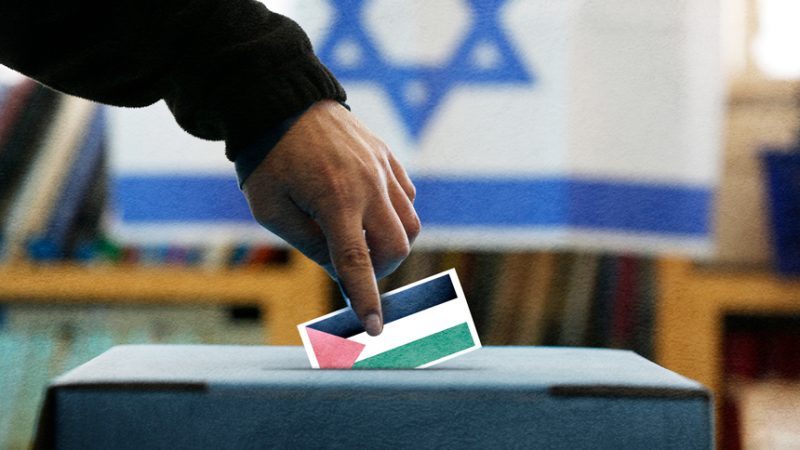The last legislative elections held in the Palestinian territories in 2006, which ended with the victory of the Islamic Resistance Movement (Hamas), had major repercussions. Most notably, a wide Palestinian split offered Israel an opportunity on a gold plate to shun any commitment to continue the peace process negotiations, on the pretext of the absence of a clear Palestinian partner capable of committing to any possible agreement.
A bitter past
In the summer of 2007, two political and executive authorities were formed, one in the West Bank under the control of Fatah and the other in the Gaza Strip under Hamas.
The two authorities were formed in response to a political crisis linked to obstacles to the peaceful transition of power, following the elections and the subjection of Palestinian Authority to Fatah, which has had autonomy since the signing of the Oslo Accords.
In this split, followed by years of Arab Spring, global and regional interest in the peace process aimed at finding a solution to the conflict between Israelis and Palestinians has declined.
Israel has exploited this retreat to impose a new reality without serious regional or international objections, expanding settlements in areas already under negotiation in the peace process.
Tel Aviv found in the administration of Donald Trump a best ally and friend.
Trump made a decision to move the US embassy to Jerusalem, a decision that was postponed until a final peace agreement is reached. His administration also ended financial aid to the Palestinians to force them to surrender to Israel’s will.
The former American president was not satisfied with that, and pushed the Palestinian issue even further with the so-called “the deal of the century,” a plan which undermined all Palestinian rights and ended the viability of any negotiations.
One of the worst things the previous US administration had done was to encourage many Arab States to normalize relations with Israel.
Under the Arab Peace Initiative, announced by the then Saudi Crown Prince Abdullah bin Abdul-Aziz and approved by the member States of the Arab League in 2002, this procedure was postponed until a final peace agreement was reached.
With the deterioration of the Palestinian position vis-à-vis the Israeli side, and in light of the arrival of a new American administration, a major step had to be made to restore normality.
Desires converge
There is no better starting place than building political consensus between the Palestinian parties, and there is no better place to achieve this goal than Cairo, which for decades has been the official sponsor of the Palestinian cause.
Cairo has, in recent years, lost a lot of its credit in this issue because of mismanagement in the last years of the rule of former President Hosni Mubarak. In addition, the chaos that Egypt has experienced over the past decade has made matters even worse.
Apparently, the desires of Cairo and the Palestinian factions converged on the importance of a major step on the internal Palestinian scene that would guarantee Palestinian unity by holding elections that undermine the arguments used by Israel to disavow the continuation of negotiations.
Regarding the Palestinian factions, all parties see a opportunity in this election to achieve their own goals.
For Hamas, which is blacklisted as a terrorist group by the European Union and the United States, the elections provide an opportunity for integration into the Palestine Liberation Organization, the universally recognized voice of the Palestinian people, while the Fatah movement wants to renew its credibility and legitimacy before entering any political process with the Israelis.
On the other hand, Cairo wants to revive the peace negotiations, unsatisfied with the rushing towards normalization of relations with Israel, a situation that swept the region in recent weeks before Trump’s departure from the White House.
Regardless of the official statements issued by Egypt, which welcomes these normalization processes, Cairo has always treated the presence of Israel on its borders as a threat to its national security.
Despite the peace agreements signed between the two countries in the seventies, the processes of normalization did not go beyond official frameworks. The popular framework remained a bulwark against the development of relations between Egypt and Israel.
Successive Egyptian governments have considered the isolation that Israel suffers in the region as one of their strong cards. Therefore, with the normalization of several Arab capitals with Tel Aviv happening now, Cairo is losing one of its most important cards.
The continuing stalemate in the peace negotiations between the Israelis and the Palestinians means another card idle in the hands of the Egyptian authorities when it comes to regional influence.
At the same time, Cairo fears that the processes of normalization with Israel will impose specific formulations on the paths of the peace process, to the detriment of the Egyptian national security interests, of which the Palestinian territories are one of its vital extensions.
Egypt’s success in persuading the Palestinians of the election process and its rules is a message that it still has influential cards on the issue, especially in the face of the new US administration, which is expected to poke its nose in Egyptian internal affairs.
After a two-day meeting in Cairo, the Palestinian factions agreed to respect the election results. Palestinian parliamentary elections are scheduled for May 22, with presidential elections scheduled for July 31.
Although Biden’s approach and administration towards the Palestinians is friendlier than his predecessor is, as he promised to reopen the headquarters of the Palestine Liberation Organization (PLO) mission in Washington and to resume humanitarian aid that Trump canceled, he has not taken any action to demonstrate the priority of the peace process for him. However, holding the elections may tempt the US president to revive the process.
Problems, not solutions
Although the Cairo Agreement attempted to establish rules to ensure preventing the chaos that followed the last electoral process, it would not prevent any differences, chaos or challenges that would result from the existence of a new Palestinian Government.
The holding of elections, whether legislative or presidential, will pose more problems than solutions.
The first issue is that Hamas, classified as a terrorist organization by the United States, will likely make significant gains in the elections.
This potential victory for Hamas could bring us back to the atmosphere of 2006. Washington and other capitals may refrain from dealing with a Palestinian government led or engaged by the movement. There will therefore be difficulty in resuming the peace process.
Although this dilemma can be resolved by the formation of a national unity government combining Fatah and Hamas, previous years have shown that such a solution is far away.
Many observers consider the most serious obstacle to the formation of such a Government is the fundamental difference between the two factions in the approach to be taken with Israel.
According to these observers, the intentions of the consensus are not quite real and do not reflect an evolution in the thinking of the two factions as an attempt to take advantage of the atmosphere of the arrival of a new US administration in the White House.
The second problem raised by the holding of Palestinian elections is the deteriorating health situation of Palestinian Authority President Mahmoud Abbas.
Abbas has no apparent successor within Fatah. At the leadership level, he may face a leadership challenge from Marwan Barghouti, imprisoned in Israel, or Mohamed Dahlan, the former head of the movement’s security in Gaza and now living in exile in the Emirates.
In addition, in the event of presidential elections, Ismail Haniyeh, head of the Hamas political office, could easily defeat him.
Third problem: If Hamas joins the forthcoming Government, the movement will remain accountable to Israel and the international community for the security situation inside the Gaza Strip.
Hamas may be committed to a state of calm towards Israel, but it may not be able to impose it. The movement faces a range of challenges from other factions, such as the Islamic Jihad in Palestine, the Popular Front for the Liberation of Palestine and even radical Salafist groups associated with ISIS. All of them criticize and sometimes even threaten Hamas rule in Gaza.
The fourth problem that may be faced by a Palestinian Government formed after the elections is the scale of popular frustration at the deterioration of social, health and educational services, as well as the deterioration of the economic situation.
The new Government will have to deal seriously with corruption, involving prominent leaders and senior officials in both Hamas and Fatah.
All of this means that Hamas’s election victory will bring the Palestinian cause back to square one, which means a deadlocked in the peace process and a continues deterioration in the Palestinian situation.
However, what if Hamas loses the election?
A new death for Oslo Accords
The Movement’s loss of the election will not necessarily lead to a political stability for the Palestinians.
Palestinians will then be faced with a difficult situation that forces them to search for a new leadership capable of ending the corruption and tyranny of the traditional factions, and finding a solution to the issue of their country.
In my opinion, the upcoming elections, if held, will worsen the Palestinian situation.
Whatever the outcome, nothing of value will be achieved for the benefit of the Palestinians. The outcome will only be a new declaration of the death of the Oslo Accords.
In the early 1990s, after two decades of fighting, Washington brokered a peaceful settlement between Israel and the leaders of the Palestine Liberation Organization. The outcome was the first Oslo Accords of 1993 and the second Oslo Accords of 1995. The agreements returned some land to the Palestine Liberation Organization (PLO) in the West Bank, but it was too little for Palestinians.
With Israel violating the Oslo Accords again and again, the holding of elections, resulting in the victory of Fatah or Hamas or even the formation of a unity government between them, is nothing but navigating the tracks created by those agreements, which have proved to be useless. The elections will restore legitimacy to those agreements.
In the 1980s, Hamas was mainly founded as a resistance movement to free Palestine from Israeli occupation by force of arms. Despite its rejection of the Oslo Accords, which entrench the negotiating approach to resolving the conflict, more than three decades later it has accepted elections within the Oslo tracks and is shifting towards negotiation rather than resistance.
Hamas seems to be repeating Fatah’s historic mistake, when it left the resistance and engaged in electoral processes and negotiations.
Some say that without elections, it would be difficult to change the political landscape, but this fails to account for the fact that past elections did nothing for the Palestinians.
I believe that countries that are under occupation do not need elections in which the liberation movements compete, as much as they need a comprehensive national action program that enjoys the support of all factions and fulfills the people’s aspirations for freedom and a decent life, combining negotiation and resistance.









Leave a Reply